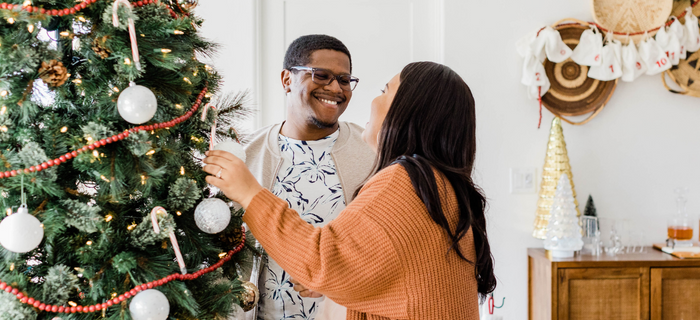How to waste less this festive season
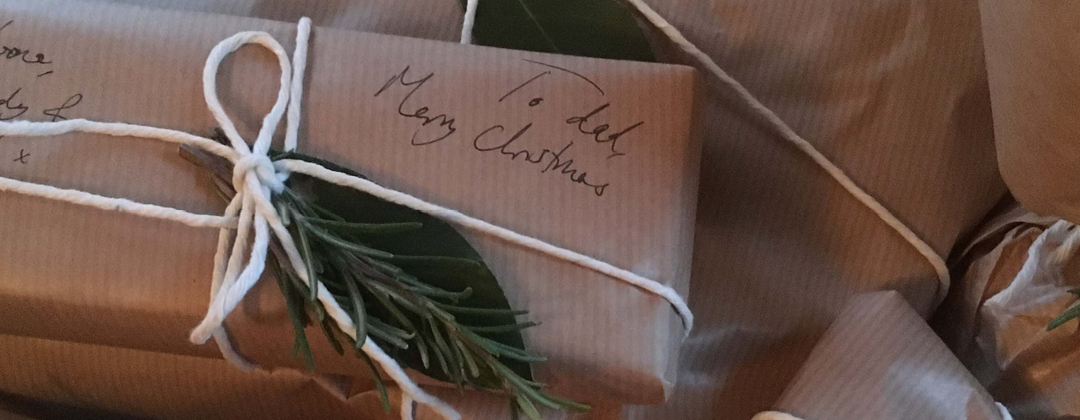
How to waste less this festive season
It’s estimated that around £42 million worth of unwanted Christmas presents are chucked away each year.
Manufacturing all these new products requires a lot of raw materials, energy and water. All of which comes at a cost to the planet. This festive season, let’s pledge to cut down on unnecessary festive waste of all kinds, including those unwanted gifts.
Scrap that festive waste
Christmas, Hanukkah and New Year can be challenging times to manage waste. It can feel like we’re supposed to do everything to excess! But getting into the holiday spirit doesn’t have to result in a mountain of festive waste.
That’s why our rubbish experts have come up with a whole host of ways to reduce festive waste, from gifting and cards to decorating your home.
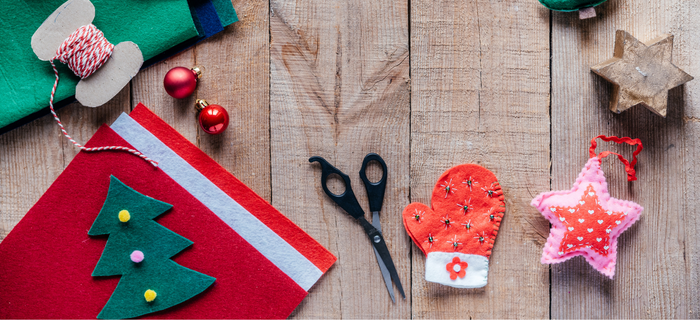
Making festive decorations is a great way to get into the festive spirit.
Greener gifts
Re-gifting
If you have any unwanted gifts why not re-gift to someone on your list.
Make gifts
Dust-off those crafting, baking or creative skills to make a personal hand-made gift.
Shop local
Reduce the gift-miles and check if any local or independent shops or makers have what you are looking for. There are loads of wonderful, local businesses in Bristol who would love your custom.
Reduce the packaging
If shopping online, check to see if you can get it delivered with minimal packaging:
- Check their shipping or packaging policy – do they use recyclable/minimal packaging?
- If buying more than one item, see if they can be shipped together.
- If you aren’t going to physically meet with the person your gift is for, consider having the item delivered directly to them to avoid duplicating the packaging and postage.
Buy second-hand
Check to see if you can get the gift you want second-hand at a charity shop, one of the Bristol Waste Reuse Shops or online.
Make a list
Reduce the likelihood of giving or receiving unwanted presents by setting up a wish list. There are lots of websites available that will allow you to add links and share with your friends and family.
Make it returnable
Include the receipt so that the recipient can return or exchange it. Put it in an envelope if you don’t want the recipient to see it unless they want to return it.
Give a donation
Donation gifts are a great alternative to physical gift-giving. There are loads of options from local, national and international charities including sponsoring animals, activities or equipment.
Reduce gift buying
If you are in a group that normally buys gifts for each other, you can reduce the number of presents bought by doing a Secret Santa.
Be specific
If you repeatedly find yourself receiving unwanted, unsuitable or over-packaged gifts from a certain source every year, try talking to them and ask them to try something different this year. The earlier you have that conversation, the more likely you are to catch them before they’ve bought you something.
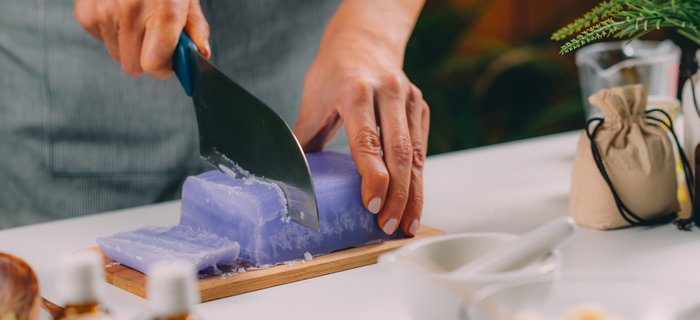
Making soap is easier than you might think, and makes a great plastic-free gift.
Wrapping Paper
Unfortunately, we cannot accept Christmas wrapping paper for recycling, even if it says it is recyclable. Here are some alternative wrapping ideas to try this year:
- Reuse old wrapping paper – save wrapping paper you receive, remove any tape and tags, and store it flat. Tip; run a cool iron over it to take out the creases. You can also find lots of almost new rolls of wrapping paper at our Reuse Shops.
- Use recyclable paper – wrap presents with brown paper or newspaper instead, as these can be recycled as normal.
- Reuseable alternatives – gift bags, tins or boxes make a good reusable alternative to wrapping paper. Try your hand at Furoshiki, the Japanese art of wrapping presents with reusable material.
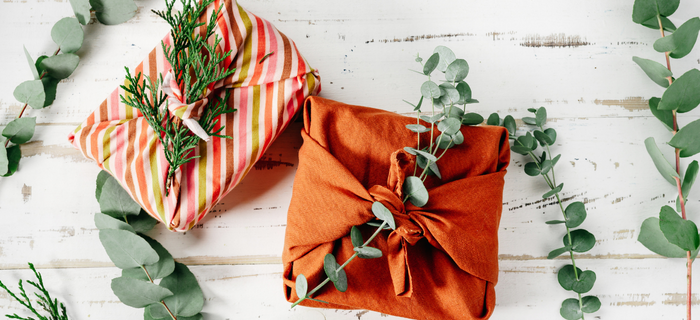
Fabric can be used over and over again to wrap presents, and it looks beautiful too!
Decorations
Get the most out of your decorations by reusing what you already have. If you want a change for this year, you could try getting them second-hand or making your own. You can find lots of ideas here, which use items you already have or can forage locally.
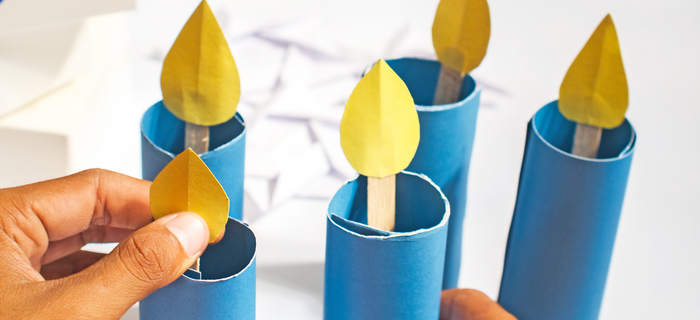
Hanukkah candles made from blue cardboard, yellow paper and lollypop sticks.
A popular activity for our #WasteNothing Challenge participants is making decorations from used drinks cans. They also used paper, card, wood and natural materials to make more festive decorations.
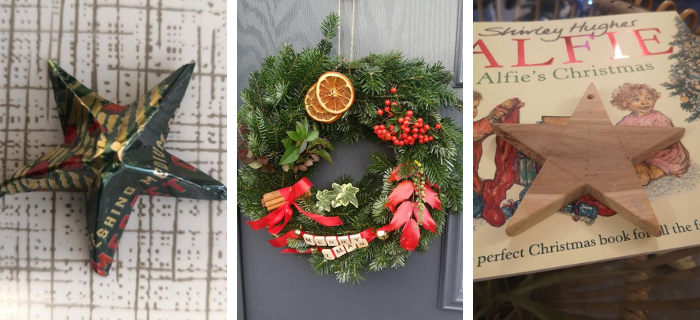
Plastic-free decorations made by our #WasteNothing Challenge participants
Cards and gift tags
For many people, Christmas cards are an important part of staying in touch. However, with an estimated one billion Christmas cards thrown away every year, they generate a lot of waste. Why not look at some of the alternatives:
Send an e-card
There are lots of websites with free e-cards available.
Shop responsibly
If you buy cards, make sure they are made from recycled paper and that they don’t have glitter or other attachments. These are the things that will make them non-recyclable.
Request no cards
If you don’t want to receive cards, let the people who are likely to send them to you know in advance.
Reuse them
If you receive cards (or have some saved from last year) reuse them for gift tags, or to make new cards.
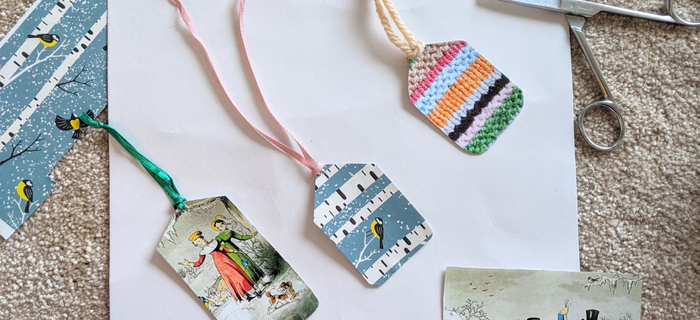
Homemade gift tags from one of our rubbish experts.
Crackers
Crackers are a staple for the Christmas dinner table, but often come with non-recyclable toys which are forgotten by the end of the meal. Here are some alternatives:
Ditch the Christmas crackers
This may not always be a popular option, but the best way to reduce unwanted waste is to avoid crackers all together.
Choose responsibly
If you can’t do without, check out this review of some of this year’s Eco Christmas Crackers.
Reuse them
There are lots of reusable crackers available which can be used year-on-year. It also means you can choose what to include to customise them for each family member. Instead of a plastic toy why not include an edible gift.
Make your own
Use up toilet roll tubes, leftover newspaper and other items around the house to make your own crackers.
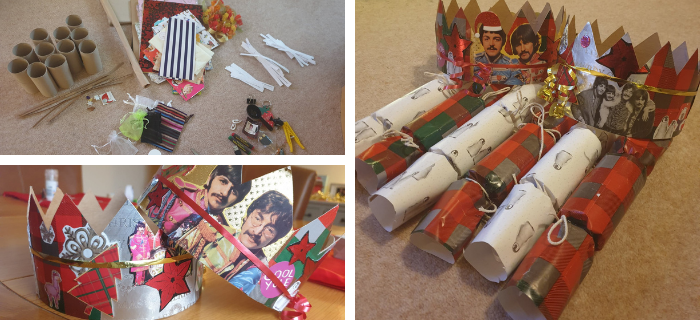
Some of our #WasteNothing Challenge participants made Christmas crackers and paper hats made from old cards and wrapping paper
Christmas trees
There are lots of options when it comes to Christmas trees. If you are debating whether to get an artificial tree or a real tree, this article by Huffington Post explains the environmental difference to help you make an informed choice.
Real trees
- Recycle your tree at the end of the festive season by putting it out with your other recycling. Check your collections calendar for the right dates to do this. Find out what happens to your tree here.
- You could buy a real pot-grown tree with roots that you can use from year to year. However, these can be difficult to maintain in good condition. If you are tempted to try this, read this helpful guide.
- Alternatively, you could rent a pot-grown Christmas tree. You borrow it for Christmas and return it to be looked after for the rest of the year
Artificial trees
- If you already have an artificial tree, reuse it to get the most out of it.
- Our Reuse Shop in Avonmouth has a wide selection of pre-loved artificial trees and decorations, as well as a wide selection of unique gifts.
- If an artificial tree would work better for your home, you may be able to find a good second hand one locally on Gumtree or other local buying groups. This is also a good place to look if you need a tree stand or second-hand baubles!
- Or you could try and make your own up-cycled Christmas tree out of waste items. There are hundreds of ideas on Pinterest using things like pallets, egg boxes or driftwood, to create a funky alternative to the traditional tree.
